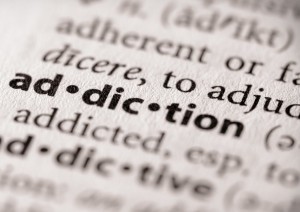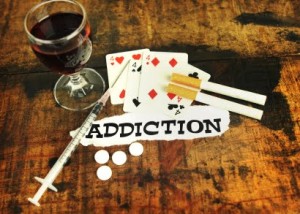Addiction is caused by a dopamine response in the brain, “so whether it is alcohol, cocaine, marijuana, or whatever you have in you”(Walker), the dopamine response triggers pleasure and and creates a “reward circuit- having pleasurable associations with a particular substance, making you feel compelled to ‘reward’ ourselves by seeking it again”(Walker).
Many people have talked about how alcoholism is genetic and how other various addictions, such as drugs or other vices can also have a genetic component that makes it very difficult for a person to let go of their addiction or prevent themselves from becoming addicted to something in the first place. There has also been mention of one gene that is “the addiction gene” that can cause people to have or be more susceptible to having an addiction. That statement is false and has no scientific basis. Yes, there is a genetic component to addiction, but “like most other diseases, addiction vulnerability is a very complex trait”(Univ. of Utah). In addition, there are also many other factors that can contribute to a person’s vulnerability to addiction “Including both inherited and environmental factors”(Univ. of Utah). An article in Nature, states how “Joni Rutter, director of the Division of Basic Neuroscience and Behavioral Research at the US National Institute on Drug Abuse in Bethesda, Maryland, says that regardless of the drug involved, “about 50% of the risk is genetic, within a range of about 40–60%.”)”(Walker). Rutter also goes on to reiterate how genetics are one one aspect of addiction as I mentioned previously.
When scientists are looking for these “addiction genes”, they are looking for a “biological difference”(Univ. of Utah) that alters a person’s ability on whether or not they would be able to resist addiction. This is no easy process either since “not every addict will carry the same gene”(Univ. of Utah) and not every person who has an “addiction gene”(Univ. of Utah) will become an addict. However, it is made clear by Dr. Mohamad in an article published about his findings in an ABC News article because “Babies of alcoholics adopted into non-drinking homes have almost the same odds(9 times as likely) of alcoholism as they would if they’d stayed with their birth parents”(Lombardi). Although, one could dispute the fact that being “9 times a likely” to develop a drinking problem is a relative risk because the absolute risk is not being stated; the detrimental health, lifestyle, and overall difficulties that could result from an addiction are worth taking seriously. However, the fact that these babies have a higher risk just due to being born into alcoholic parents, and not even being raised by them, suggests that there is a genetic component at play controlling part of the outcome.
As far as environmental factors go, there are many that can contribute to make an individual more susceptible to having an addiction. For instance, “a recent CNN medical segment [“Teenage binge drinkers are more likely to become adult alcoholics” 6/16/04″] reported that a study had found that teen binge drinking was linked to an increased risk for alcoholism by 3.81%”. The study also concluded upon further analysis that the sooner an individual tries a sip or have “even a small drink…could [result in] a problem later on in life”(alcohol news). In addition Dr. Muhammad explained how parents who condone their children to drink or do drugs with them or who allow them to do so in the house are sending a message of false safety and that “getting high or drunk is a smart idea”(Lombardi). It is also important to note that environmental factors can be solely responsible in specific cases for triggering a relapse of a person’s addiction. For example, if a sober person is around drugs or alcohol like they once were when they were using, this can trigger the genetic factors to once again come in play and make it that much harder for a person to resist their chosen vice.
High school and college students are impressionable and are still trying to find themselves. College especially is associated as a time for experimentation and because of this, more environmental risks can at their respective schools can cause them to fall on the slippery slope to addiction. In a study done in 2005, analyzing “2,000 college students at 400 different schools”, from 1993 to 2005, the number of drinkers had not increased, but the “intensity”(CASA Columbia) of overall drinking had “jumped sharply: binge drinking rose by 16%, people who drank 10 or more time in a month rose by 25%, getting drunk at least 3 times a month rose by 26%, and lastly going from drank to getting drunk rose by 21%”(CASA Columbia). Lastly, “marijuana use more than doubled”(columbia) and use of harder drugs such as “cocaine and heroine rose by 52%”(CASA Columbia). Even more shocking is the fact that these numbers, especially those relating to marijuana usage have most likely increased since the drug has become legal in certain states.
The combination of genetic and environmental factors are what cause people to have a difficult time steering clear of addiction or not suffering from its detrimental effects repeatedly after attempts to become sober. The role of genetics in addiction is not anything to be taken lightly and should not be discounted by an individual thinking that this will not make them more vulnerable. In addition, being aware of how your “home, family, school, and friends”(National Institute Drug Abuse) can affect your decision making when it comes to drugs, alcohol, or other vices should also be taken into consideration. Anyone is vulnerable to addiction and some more so due to increased genetic and environmental factors, as college students it is important for each of us to keep that in mind when making smart and safe decisions.
Works Cited:
Walker, Regina. “So, Is Addiction Genetic? Or Not? | The Fix.” The Fix. 1 Sept. 2015. Web. 4 Dec. 2015. <https://www.thefix.com/Genetics-addiction-connection-regina-walker0901>
“Genes and Addiction.” Genes and Addiction. University of Utah. Web. 4 Dec. 2015. <http://learn.genetics.utah.edu/content/addiction/genes/>
Lombardi, Lisa. “Is Drug Addiction Genetic?” ABC News. ABC News Network, 25 Sept. 2014. Web. 4 Dec. 2015. <http://abcnews.go.com/Health/Wellness/drug-addiction-genetic/story?id=25728024#5>
“Underage Drinking, the Statistics and the Solutions.” Underage Drinking, the Statistics and the Solutions. George Mason University. Web. 4 Dec. 2015.
<http://alcoholnews.org/Underage%20drinking.html >
“Drug Abuse and Addiction.” Drug Abuse and Addiction. National Institute Drug Abuse. Web. 4 Dec. 2015. <http://www.drugabuse.gov/publications/drugs-brains-behavior-science-addiction/drug-abuse-addiction>
“Wasting the Best and the Brightest: Substance Abuse at America’s Colleges and Universities.” CASAColumbia. 1 Mar. 2007. Web. 4 Dec. 2015.



Addiction is a horrible situation and it affects so many people. Although there are many ways that you can stop yourself from getting addicted to something, here are some other methods of coping with addiction that may help someone in this predicament http://www.helpguide.org/articles/addiction/overcoming-drug-addiction.htm